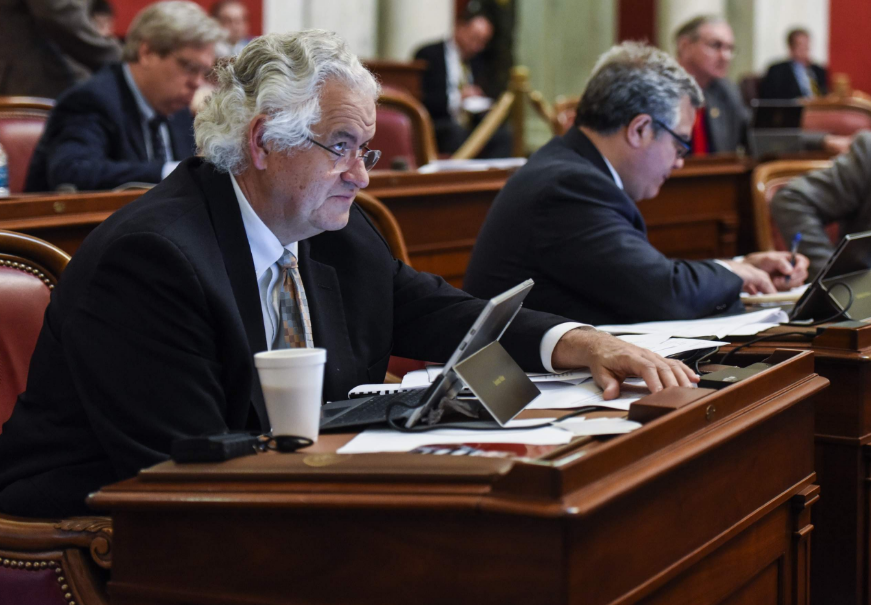Coal Bill Passes WV Senate

By Ken Ward, Jr.
March 30, 2017 - The state Senate on Wednesday evening approved a bill that makes relatively minor changes in West Virginia’s mine safety laws, but rewrites the state Department of Environmental Protection’s definition of a healthy stream to remove language that requires the DEP’s goal to be for each of the state’s waters to have “a balanced aquatic community that is diverse in species composition.”
Senators approved the measure on a 32-2 vote. Only Sens. Bob Beach, D-Monongalia, and Mike Romano, D-Harrison, voted against the bill. The bill now goes to the House of Delegates.
Senate Bill 687 emerged last week from the Committee on Energy, Industry and Mining as a replacement for another piece of legislation that sought to strip the state Office of Miners’ Health, Safety and Training of almost all of its authority to inspect coal mines, cite violations, or levy fines.
That original bill caused a brief national stir, earning a critical editorial in The New York Times and a Los Angeles Times op-ed commentary in which Coalwood native and “Rocket Boys” author Homer Hickam called moves to reduce mine safety enforcement in West Virginia “foolish ideas.”
Sen. Randy Smith, R-Tucker and the bill’s chief sponsor, quickly pulled the bill and tried to depict its most drastic provisions as something he threw into the legislative hopper to bring industry, labor and regulators to the table to negotiate on a more serious mine safety measure.
“I took a lot of bad press because of my tactic to get here,” said Smith, who is chairman of the Senate committee and employed as a safety manager for Mettiki Coal’s large underground mine in his district. “It’s sad you have to create a self-made disaster to get attention and get people to really talk about coal mine safety.”
Stephanie Ojeda, a lawyer for Smith’s committee and a former in-house lawyer for Patriot Coal and Massey Energy, said last week that the original language in Smith’s original bill was prepared by the West Virginia Coal Association, the industry’s lobby organization.
During Wednesday’s floor session, Sen. Ron Miller, D-Greenbrier, said that he had been ready to vote against the legislation because of its environmental provisions. Miller had tried unsuccessfully on Tuesday to have part of the environmental changes taken out of the bill. Miller voted for the bill, though, and said he did so because of the safety provisions in the new legislation.
The version of the bill that passed the Senate Wednesday night, though, contains only one practical improvement in mine safety: A requirement that all mines include in their first-aid equipment automated external defibrillator. The bill also combines several existing state mine safety boards, and contains language to rewrite state rules on the use of diesel equipment in underground mines to reflect the elimination two years ago of a separate state board on that issue.
But, the latest version of the bill maintains a variety of changes in state environmental law related to the coal-mining industry, including weakening of bond-release requirements for certain mountaintop removal mining operations and language to limit the spending of money from the state’s Special Reclamation Fund to clean up water pollution at abandoned mine sites.
Also, the latest bill maintains language from Smith’s original proposal that would rewrites the requirements in existing law for the DEP to develop a new rule to implement a key part of the state’s water quality standard that aims to protect the biological integrity of the state’s rivers and streams.
Specifically, the bill removes from the law the mandated that any rule the DEP develops for evaluating the health of streams include a determination that the stream “supports a balanced aquatic ecosystem community that is diverse in species composition.” The bill would leave language that would require the DEP to consider only whether streams contain “appropriate trophic levels of fish, in streams that have flows sufficient to support fish populations.”
Jason Bostic, a vice president of the West Virginia Coal Association, has said that the language is part of the industry’s continuing effort to fight U.S. Environmental Protection Agency guidance and rulings by U.S. District Judge Robert Chambers related to water pollution discharges from mining operations.
Earlier this year, Chambers had criticized the DEP for dragging its feet in writing the new rules, in a decision in which the judge said state officials and the EPA have both delayed for too long in ensuring the state has plans in place that would clean up rivers and streams where aquatic life has been damaged by coal-mining pollution. Chambers has also issued a series of rulings requiring coal companies to clean up pollution, citing the latest science linking coal-mining pollution to diminished stream health.
Smith said he was pleased with the environmental provisions of the bill.
“It’s just one sentence in language of another way to, I guess, test the streams or whatever,” Smith said.
Smith portrayed the language as being agreed to by the DEP and other stakeholders, and conceded when questioned by Miller that the West Virginia Rivers Coalition was not involved in his closed-door negotiations on the new bill.
“We just took the main agencies,” Smith said. “If we took every club or organization in to get their opinion, we’d be there ... we only have 60 days.”
Smith added, “There are a lot of organizations out there that if they could shut the coal industry down they would have shut it down years ago. This part was a loophole that allowed them to get in to try to shut down operation, not because they were unsafe or because they were polluting the water, just because it was a loophole.”
Angie Rosser, executive director of the West Virginia Rivers Coalition, said her group would actively oppose the water quality standards portion of Smith’s bill.
“The changes reject the best science for monitoring a stream’s biological health, for no other reason than to try to let coal companies off the hook for killing off stream life,” said Rosser, whose group was a plaintiff in the lawsuit Chambers ruled on. “And we’re not out to stop coal mining, but to make sure that coal companies operate responsibly by being able to hold them accountable to the law. This change would make it harder to do that.”

Sen. Ronald Miller, D-Greenbrier, sits at his desk during a Senate floor session.
Photo by Sam Owens, Gazette-Mail

